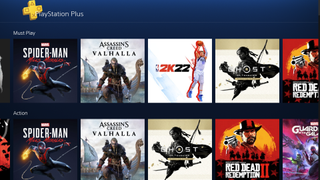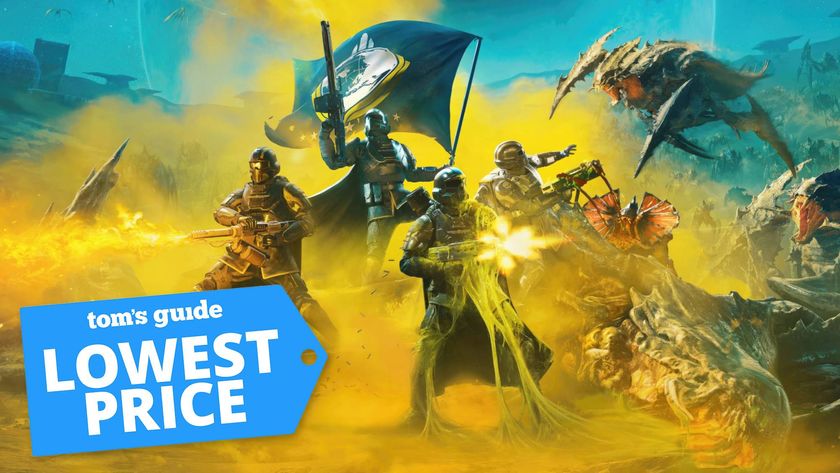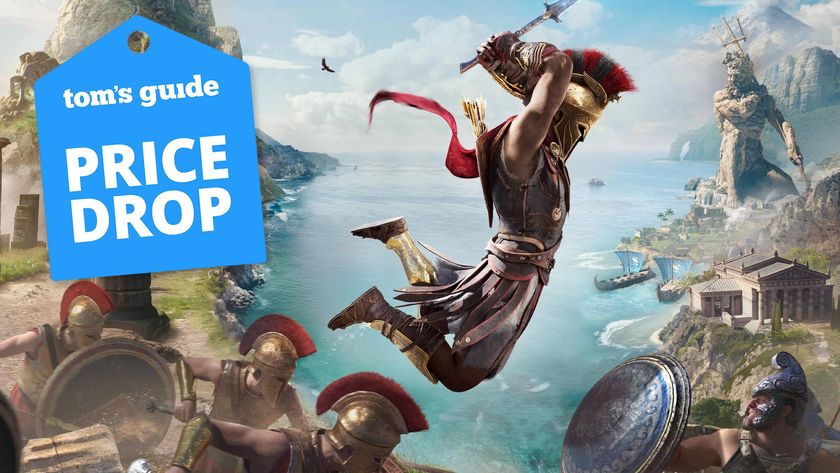PlayStation Plus: Everything you need to know
Sony has completely revamped PlayStation Plus, with a huge game library and cloud gaming features

PlayStation Plus used to be a simple proposition: Pay a flat monthly fee to play PlayStation games online, and get a few complimentary games each month as a perk. Now, PlayStation Plus is a full-fledged subscription service, with a huge game library, cloud gaming features and a variety of pricing tiers.
The PlayStation Plus revamp went live in the United States on June 13, and Tom’s Guide has had a chance to evaluate the service for ourselves. Here’s what you can expect from PlayStation Plus in terms of pricing, performance, game selection and more.
What is PlayStation Plus?

Simply put, PlayStation Plus is Sony’s game subscription service, much like Microsoft’s Xbox Game Pass. By paying somewhere between $5 and $18 per month, you get access to a variety of games, features and perks on PS4 and PS5 consoles. At a minimum, you’ll get the ability to play multiplayer games online, as well as a few complimentary titles each month. If you shell out for the highest tier, you’ll be able to download and stream hundreds of games from the PS1 all the way through the PS5.
The revamped service is currently available in Asia and North America, with a European release coming on June 23.
Previously, Sony offered two separate online services. PlayStation Plus let players get online for multiplayer games, offered three complimentary titles per month and gave a handful of exclusive discounts and in-game perks. PlayStation Now, on the other hand, was a cloud gaming service that could stream hundreds of Sony titles (mostly PS3) to a PS4, PS5 or PC. The new PlayStation Plus tiers essentially combine these two programs.
PlayStation Plus tiers and pricing

PlayStation Plus offers three different tiers, each with different benefits and prices. Generally speaking, you can expect to pay between $10 and $18 per month, or between $60 and $120 per year. Briefly, here’s how the varying tiers break down:
PlayStation Plus Essential is basically the same as what PS Plus used to offer. Neither the functionality nor the price changed. That means you get online play, cloud saves, rotating downloadable games and additional PS Store discounts. It costs $10 per month, $25 per quarter or $60 per year.
PlayStation Plus Extra includes everything from the Essential tier, as well as “a catalog of up to 400 of the most enjoyable PS4 and PS5 games,” according to Sony. (Tom’s Guide recorded 383 games on June 16, 2022.) Players can download and play both first- and third-party fare on a PS4 or PS5 console. It costs $15 per month, $40 per quarter or $100 per year.
PlayStation Plus Premium includes everything from the previous two tiers, in addition to hundreds of additional games from the PS1, PS2, PS3 and PSP. (Tom’s Guide recorded 38 PS1/PS2/PSP games, and 308 PS3 games on June 16, 2022.) Players can download or stream PS1, PS2 and PSP titles; PS3 titles are streaming-only. Players can stream games on a PS4, PS5 or PC. They’ll also be able to play “time-limited game trials” with 15 different games available at launch. It costs $18 per month, $50 per quarter or $120 per year.
Check out our full guide on PlayStation Plus Essential vs. Extra vs. Premium tiers for more information.
PlayStation Plus games

Tom’s Guide perused the various games available across the three different PlayStation Plus tiers. At the time of writing (June 16, 2022), if you subscribe to PlayStation Plus Essential, you’ll have access to three games, which rotate monthly. If you subscribe to PlayStation Plus Premium, you’ll have access to about 750 different games from six different consoles. That’s a pretty significant difference.
Here’s what Tom’s Guide found across the various PS Plus categories:
- 383 PS4/PS5 games
- 38 PS1/PS2/PSP games
- 15 PS4/PS5 game trials, 2 hours per game
- 308 PS3 games (all streaming)
- 212 streaming games (non-PS3)
- 3 rotating monthly games
- 19 PlayStation Plus Collection games
It’s likely that these numbers will increase over time, although the exact game selections will rotate in and out, much like Netflix or Xbox Game Pass.
You can find a more thorough catalog on the official PlayStation Plus website. However, Tom’s Guide has selected a few highlights from each category here, to give you an idea of the library’s breadth and depth:
PS1 games
- Ape Escape
- Mr. Driller
- Oddworld: Abe’s Oddysee
- Resident Evil: Director’s Cut
- Wild Arms
PS2 games
- Hot Shots Tennis
- Jak and Daxter
- Kinetica
- Rogue Galaxy
- Star Wars: Jedi Starfighter
PS3 games
- God of War: Ascension
- Infamous
- Ratchet & Clank Future: A Crack in Time
- Red Dead Redemption
- Tokyo Jungle
PS4 games
- Bloodborne
- Doom (2016)
- Final Fantasy XV
- Hollow Knight
- Marvel’s Spider-Man
PS5 games
- Assassin’s Creed Valhalla
- Death Stranding Director’s Cut
- Demon’s Souls
- NBA 2K22
- Returnal
To find games to play, you can also browse among 20 different categories, including Action, RPG and Simulation. There’s also an entire section dedicated to remasters, which should help players find games such as God of War II and Final Fantasy X, which have appeared throughout multiple console generations.
It’s difficult to generalize about a library of more than 700 games, but we can at least say that we appreciate the diverse selection. There are big first-party Sony hits; there are obscure third-party cult favorites; there are games you’ve probably played to death, and games you’ve probably never heard of. We also noticed that there are plenty of kids’ games, which is something that modern consoles apart from the Switch have struggled to prioritize.
While we can’t promise that PlayStation Plus will appeal to every single gamer on Earth, there really does seem to be something for everyone here — even if you discount titles you’ve played before.
PlayStation Plus streaming

If you sign up for PlayStation Plus Premium (and if it’s available in your region), you’ll be able to stream hundreds of games to your PS4, PS5 or PC. This feature is mostly in place to facilitate the PS3 library, since the PS3 used an unusual system architecture, and it would be almost impossible to play its games natively on the PS4 or PS5.
Still, Tom’s Guide counted more than 200 non-PS3 titles that are also available for streaming, which could make PlayStation Plus Premium a valuable investment for gamers who don’t want to be married to a single console, or a single TV. Players can stream a variety of games, from Assassin’s Creed Valhalla, to Marvel’s Spider-Man: Miles Morales, to Prey (2017).
The feature requires between 5 and 15 Mbps of broadband speed to work properly, although in our testing, a fast wireless connection seemed to do just as well as a wired one. Streaming non-PS3 games is admittedly a niche feature if you have a PS4 or PS5, since you can just download the game and get better performance anyway. It’s potentially a little more useful on the PC, although that comes with its own set of caveats.
PlayStation Plus performance

We tested PlayStation Plus games on a PS5 (both downloaded and streaming) as well as a PC (streaming only). There’s not much to discuss when it comes to downloading PS Plus games on a console. They work just like any other downloaded game — although it’s worth remembering that you’ll lose access to them if you cancel your subscription. You won’t, however, lose your save files, so you can simply choose to buy the game à la carte afterward. Likewise, your save files will still be there if you ever resubscribe.
Streaming games on the PS5 worked surprisingly well. I tested some PS3 games, spending the most time with Castlevania: Mirror of Fate HD, as well as some PS4 games, spending the most time with Infamous: Second Son.
The PS3 experience was nearly flawless, save for a long initial load time, and one moment of lag during a cutscene. The PS4 experience was similarly good, although I did notice a little more texture pop-in when I explored large environments. The resolution also took a little while to hit a full 1080p. Otherwise, though, the experience was nearly indistinguishable from a downloaded game. Your results will depend on the strength of your broadband connection, but the 15 Mbps recommendation is not too stringent.
The performance on PC was likewise strong. I encountered no issues on the PS3 streams, and only a few moments of blurry resolutions or textures on the PS4 streams. However, streaming PS Plus games to PC is still something of a mixed bag.
PlayStation Plus on PC

To play PS Plus games on a PC, you’ll have to download the PlayStation Plus PC app. The system requirements are modest, so you don’t need a gaming PC to use it by any means. On the other hand, there’s no way to download any of the games, or stream to a mobile device or a Web browser, features which Xbox Game Pass has offered for years.
Even taken on its own merits, though, the PS Plus PC app is not very good. It starts off on the wrong foot, when it asks you to sign in, solve a captcha puzzle and input your 2FA info — then automatically signs you out and makes you do it all over again. Once you get up and running, there’s no way to search for titles, and there’s no way to choose the categories you want to browse. You can’t use a DualSense controller; you can’t use a DualShock 4 wirelessly, unless you have a specialized adapter, which Sony discontinued five years ago.
Once you get a game up and running, it works pretty well, depending on your Internet setup. But there are a lot of hoops to jump through first, and relatively few ways to play what you want.
Bottom line

PlayStation Plus has a lot going for it, with excellent performance and a library that’s sure to delight even the pickiest console gamer. On the other hand, it’s simply not available on as many platforms as Xbox Game Pass, and doesn’t work as well on PC.
Sony will undoubtedly continue to refine and expand PS Plus over the next few months, and Tom’s Guide will evaluate new features as they become available. In time, Sony’s subscription service could go from “good” to “indispensable.”
Sony will soon offer a loyalty program called PlayStation Stars.
Sign up to get the BEST of Tom's Guide direct to your inbox.
Get instant access to breaking news, the hottest reviews, great deals and helpful tips.
Marshall Honorof is a senior editor for Tom's Guide, overseeing the site's coverage of gaming hardware and software. He comes from a science writing background, having studied paleomammalogy, biological anthropology, and the history of science and technology. After hours, you can find him practicing taekwondo or doing deep dives on classic sci-fi.













